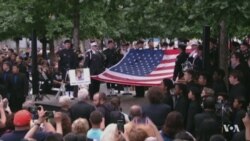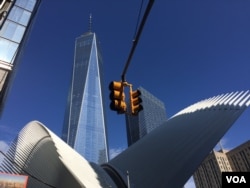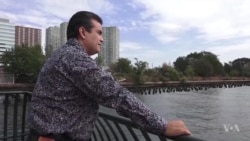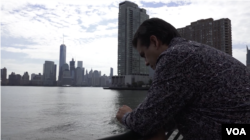Fifteen years ago, the ashes and debris from the September 11 attacks on the World Trade Center filled the cemetery at St. Paul’s Chapel in lower Manhattan.
Though slightly damaged, it never fell that day, earning the name “The Little Chapel That Stood,” while serving as a place of rest and refuge for relief workers during their greatest time of need.
There on the corner of Broadway and Vesey, the chapel’s rector tolled the "Bell of Hope" in four sets of five strokes — a traditional firefighters’ salute to the fallen — to commemorate the 15th anniversary of the hijacked plane attacks that forever changed the nation.
In the back, a woman stood motionless, staring relentlessly upon the graves and surrounding lush field.
“Where there is hatred, let us sow love,” prayed the session’s rector, Rev. William Lupfer.
Moments later, the fog cleared from New York’s Freedom Tower, revealing a sky as blue and peaceful as that fateful September morning.
In lower Manhattan’s Ground Zero, to the marching footsteps of American policemen and women, the nation paid solemn tribute to all who had fallen -- from New York to the Pentagon and a field outside Shanksville, Pennsylvania. One by one, relatives and loved ones of 9/11 victims recited the names of the nearly 3,000 victims who died that day.
WATCH: Related video report of man who saved many at Ground Zero
E pluribus unum
President Barack Obama, after a private moment of silence at the White House, laid a wreath at the Pentagon and delivered a message of unity.
“It is so important today that we reaffirm our character as a nation of people drawn from every corner of the world, every color, every religion, every background, bound by a creed as old as our founders,” Obama said. “E pluribus unum. Out of many we are one.”
The United States, Obama assured, will never give in to tactics of fear.
“In the end, the most enduring memorial to those we lost is ensuring the America that we continue to be, that we stay true to ourselves, that we stay true to what’s best in us, that we do not let others divide us.”
Fresh wounds
To this day, 9/11 survivors must relive the horrors they faced constantly, along with the health repercussions that followed.
Faith Fishkin, who lost her father — an NYPD detective — to post 9/11-related pancreatic cancer in May, said this year’s ceremony opened fresh wounds.
“We don’t wish this pain on anybody,” she said alongside her mother, with moist eyes and a voice shaken, struggling to find her words.
“NYPD, family, friends; he was always the one to run to help. So I remember my dad as someone who was always there to help everybody,” Fishkin added.
William Rodriguez, a former janitor at the World Trade Center, said the memories from that day will last with him for the rest of his life. On September 11, 2001, he used his master key to open as many doors as he could before exiting himself and becoming buried alive under the rubble.
“I figured I am going to die here squished to death,” he recalled, but the truck he crawled under held up.
“Once I got pulled from under the rubble, hours after, I was in shock,” he recounted. “I couldn’t find any of those buildings...the only thing you saw was a five-story pile of debris.”
Today, Rodriguez advocates for survivors, but fears that many who continue to struggle have been left behind.
“Everybody was together. The liaison was very strong. The ties with the victims were constant,” Rodriguez said, of the initial aftermath. “Then people got tired. People said, ‘Okay, it's time to move on,’ while the victims were still suffering.”
Rodriguez finds his personal strength today from his loved ones and by helping others. Atop his bed is a sign that reads: “Who did you help today?”
“You know somebody is probably worse off than you,” said Rodriguez.
“That gives me the motivation, disposition and enthusiasm to go and look for people that need help.”
Victoria Kupchinetsky contributed to this report.








